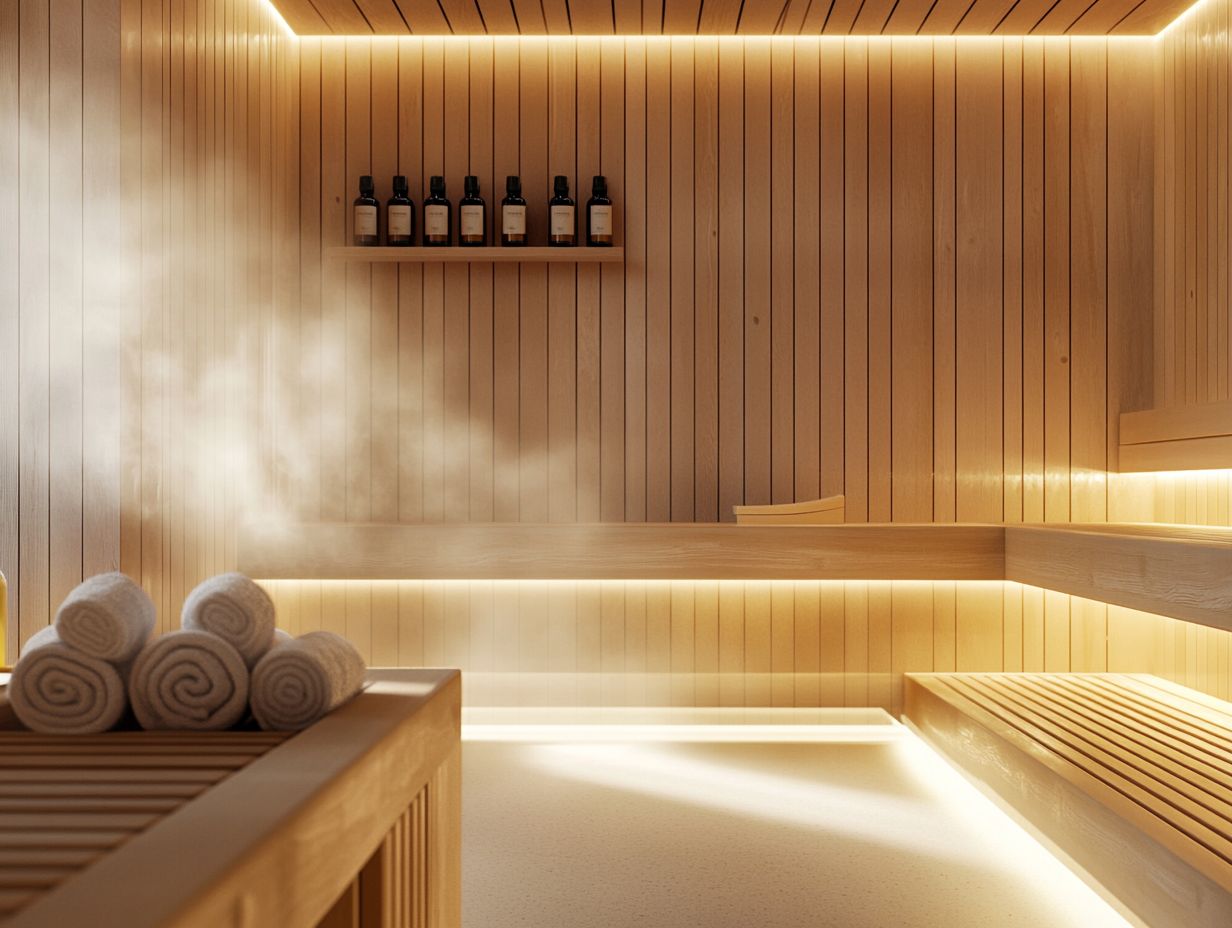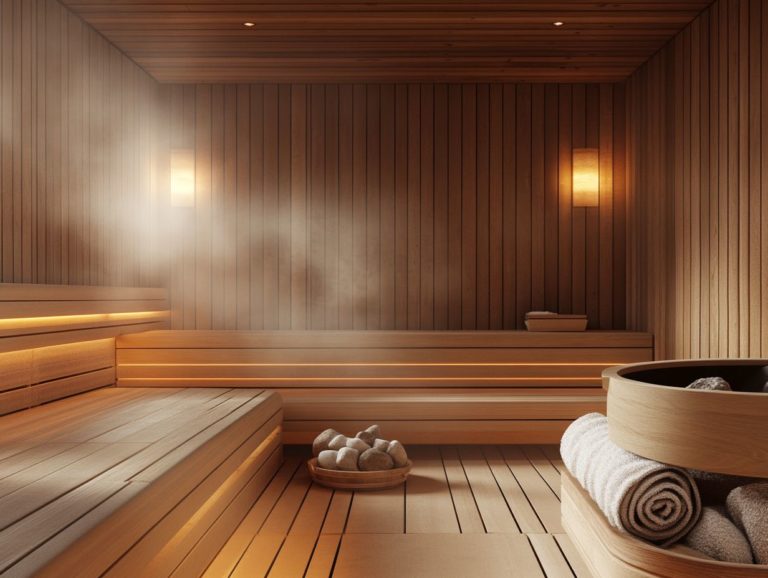The Role of Aromatherapy in Saunas
Aromatherapy is an age-old practice that taps into the power of essential oils, including eucalyptus and peppermint oil, to improve your well-being and help you relax. When paired with the soothing warmth of saunas, it provides a distinctive sensory experience that can truly transform your wellness routine, enhancing your emotional well-being and offering stress relief.
Let s explore what aromatherapy is, its history, and its benefits in sauna environments. You ll discover the calming properties of lavender oil, the invigorating scent of eucalyptus oil, and popular essential oils such as tea tree, lemon, and cedarwood. We ll also share practical usage tips and essential precautions to keep in mind.
Whether you re a seasoned sauna aficionado or just starting, you ll uncover how aromatherapy can enhance your relaxation experience with mental clarity and mood enhancement.
Contents
- Key Takeaways:
- What is Aromatherapy?
- The Benefits of Aromatherapy in Saunas
- Types of Essential Oils Used in Aromatherapy Saunas
- How to Use Aromatherapy in Saunas
- Possible Risks and Side Effects
- Frequently Asked Questions
- What is the role of aromatherapy in saunas?
- How does aromatherapy work in saunas?
- What are the benefits of using aromatherapy in saunas?
- Which essential oils are commonly used in saunas for aromatherapy?
- What precautions should I take when using aromatherapy in saunas?
- Can I use aromatherapy in any type of sauna?
Key Takeaways:

- Aromatherapy in saunas creates a relaxing and invigorating atmosphere.
- Using the right essential oils, such as frankincense and ylang ylang, can provide health benefits like reducing stress and improving respiratory health.
- It is important to exercise caution and follow proper methods when using aromatherapy in saunas, especially for those with sensitivities or allergies to certain scents, such as pine and cinnamon.
What is Aromatherapy?
Aromatherapy uses natural oils from plants to improve your emotional and physical health. This ancient art has roots in various cultures and thousands of years of history, utilizing the therapeutic properties of these oils to foster relaxation and boost mental clarity.
By embracing the invigorating scents of eucalyptus, lavender, tea tree, and peppermint, you can tap into natural detoxifiers. These oils purify your environment while uplifting your mood and relieving stress.
Definition and History
Aromatherapy dates back to ancient Egypt, where essential oils were essential for rituals and health. The Greeks incorporated fragrant oils into their medicinal practices, while the Romans designed elaborate bathhouses infused with aromatic extracts for relaxation and rejuvenation.
In Eastern traditions, particularly within Ayurveda and Traditional Chinese Medicine, certain scents are believed to align spiritual energies and promote healing. This ancient art has transformed into a sought-after therapeutic practice in modern wellness, blending holistic and scientific approaches to enhance mental, emotional, and physical health through the subtle power of essential oils.
The Benefits of Aromatherapy in Saunas
Using aromatherapy in saunas offers many health benefits and turns your sauna into a relaxing space. The harmonious blend of steam and essential oils creates an invigorating atmosphere that relieves stress and promotes mental clarity.
As the sauna purifies the air and your body, essential oils like eucalyptus and lavender enhance the therapeutic essence of this rejuvenating ritual, making each session a truly enriching experience.
Enhancing the Sauna Experience
Enhancing your sauna experience through aromatherapy involves selecting essential oils that evoke a sense of calm and promote relaxation.
By incorporating oils like lavender, chamomile, and eucalyptus, you can craft a serene atmosphere that truly nurtures tranquility.
Lavender oil, celebrated for its soothing aroma, significantly reduces stress and fosters a peaceful ambiance. It is the perfect choice for anyone looking to unwind.
Chamomile, with its delicate floral notes, calms the mind and alleviates muscle tension, enriching your overall sauna experience.
Eucalyptus oil invigorates the senses and supports respiratory health, infusing a refreshing element that can uplift your spirit. When these oils are combined, they enhance the therapeutic benefits of heat therapy, which refers to the therapeutic use of heat for relaxation and muscle relief, while elevating your mood and relaxation. This transforms the sauna into a holistic sanctuary of well-being.
Potential Health Benefits

Using essential oils goes beyond relaxation; they encompass significant improvements in skincare and respiratory health.
When you blend essential oils with steam, you create a scented space that uplifts your spirit while aiding in the detoxification of your skin.
Oils like lavender and tea tree are celebrated for their soothing properties, helping to promote a clearer complexion and reduce minor skin irritations. Inhaling essential oils such as eucalyptus or peppermint during your sauna session can open your airways, making it easier to breathe and potentially alleviating symptoms of colds and asthma.
This blend of hot steam and botanical extracts supports your overall emotional well-being, offering a multi-faceted approach to health that rejuvenates both body and mind.
Types of Essential Oils Used in Aromatherapy Saunas
Explore a world of essential oils for aromatherapy saunas, each offering distinct benefits to elevate your overall experience.
Consider eucalyptus oil, renowned for its uplifting aroma and support for respiratory health. Lavender oil is another excellent choice, cherished for its calming effects.
Don’t overlook tea tree oil, celebrated for its skin care properties, and peppermint oil, known for its invigorating scent that sharpens mental clarity.
The oils you select can profoundly impact both the ambiance and the health advantages of your sauna experience. Choose wisely to maximize your sauna’s benefits!
Popular Choices and Their Effects
When considering essential oils for your aromatherapy sauna, eucalyptus, lavender, tea tree, and peppermint truly shine with their distinctive effects.
Each of these oils, such as lemon and ylang ylang, offers a unique array of benefits that can elevate your sauna experience while enhancing both emotional well-being and physical health.
Eucalyptus, with its refreshing aroma, works wonders for clearing the airways, making each breath feel effortless.
Lavender is your go-to for relaxation it helps alleviate stress and significantly improves your sleep quality.
Tea tree oil, renowned for its antimicrobial properties, supports skin health, making it an excellent choice for detoxifying after a sauna session.
Let’s not forget peppermint, which invigorates your senses, stimulates your mind, and boosts your energy. Its uplifting scent adds a refreshing contrast that enhances the overall ambiance of your sauna experience.
How to Use Aromatherapy in Saunas
Using aromatherapy in saunas requires a thoughtful approach to maximize benefits while ensuring your safety and comfort.
By incorporating essential oils in the right way, you can elevate your sauna experience, transforming it into a serene haven infused with invigorating scents.
However, it s crucial to take precautions, especially if you have sensitive skin, so you can fully relish the calming effects without any unwanted reactions.
Methods and Precautions
You have several effective methods to incorporate essential oils into your sauna sessions, each requiring specific precautions for a safe and enjoyable experience.
One popular technique is to dilute the essential oil in a carrier oil before applying it to your skin. This minimizes the risk of irritation and allows the delightful scent to disperse gently throughout the sauna, creating a serene environment. You can also place a few drops on a cloth or towel within the sauna to craft an aromatic atmosphere without direct skin contact.
If you have sensitivities, always perform a patch test before fully applying any oils. Opt for those known for their gentleness, such as lavender or chamomile. Staying informed about each oil’s potency and potential allergens can enhance your overall sauna experience, transforming it into a truly rejuvenating ritual.
Possible Risks and Side Effects

Using aromatherapy during sauna sessions can provide numerous benefits. However, it s crucial to be mindful of the potential risks and side effects associated with essential oils and their application.
Precautions for Sensitive Individuals
Sensitive individuals should take special precautions when using essential oils, especially those with strong scents like tea tree and eucalyptus oil, to avoid unwanted side effects and ensure a comfortable experience.
Start by properly diluting essential oils, ideally with a carrier oil. This significantly minimizes the risk of irritation. A good rule of thumb is to mix one drop of essential oil with a teaspoon of carrier oil for topical applications. It’s also wise to conduct a patch test on a small area of skin before fully incorporating any oil into your sauna routine.
Be cautious with certain oils, like peppermint or cinnamon; they can be too intense and are best avoided to minimize adverse reactions. Instead, consider using gentler oils, such as lavender or chamomile, which provide soothing benefits while ensuring your safety.
Always remember, moderation is key for those with sensitivities.
Summary and Final Thoughts
The integration of aromatherapy into your sauna experience amplifies relaxation and fosters a range of health benefits associated with essential oils.
Imagine stepping into a sauna where aromatic compounds envelop you, creating a serene atmosphere that encourages deep breathing and helps wipe away the stresses of the day. Using essential oils like lavender can melt away tension, eucalyptus helps you breathe easier and feel revitalized, and invigorating citrus blends can energize your spirit. Understanding the role of saunas in detoxification can further enhance this harmonious blend and transform your sauna experience.
By harnessing these natural scents, you can soothe sore muscles and uplift your mood, reconnecting with your inner self. Embracing aromatherapy in your sauna sessions enriches the sensory experience while enhancing your mental clarity and physical vitality, highlighting the role of saunas in stress management as a vital aspect of holistic wellness practices.
Frequently Asked Questions
What is the role of aromatherapy in saunas?
Aromatherapy uses natural plant extracts, such as essential oils, to promote physical and psychological well-being. In saunas, aromatherapy enhances the overall experience and provides additional health benefits.
How does aromatherapy work in saunas?

Aromatherapy works in saunas through inhalation and absorption. The heat and steam open up the pores in our skin, allowing essential oils to be absorbed into our bloodstream. Inhaling the scents stimulates the olfactory system, which can directly affect our mood and emotions.
What are the benefits of using aromatherapy in saunas?
The benefits of using aromatherapy in saunas include relaxation, stress relief, improved respiratory health, pain relief, and enhanced skin health. The specific benefits depend on the essential oils used.
Experience the transformative benefits of aromatherapy in your sauna today!
Which essential oils are commonly used in saunas for aromatherapy?
Commonly used essential oils in saunas include eucalyptus, lavender, peppermint, and citrus oils. These oils offer various therapeutic benefits and can be combined for enhanced effects.
What precautions should I take when using aromatherapy in saunas?
Always dilute essential oils before use. Some oils may irritate the skin if applied directly. Test for allergies with a small amount first, and consult a doctor if you have health concerns or are pregnant.
Can I use aromatherapy in any type of sauna?
You can use aromatherapy in traditional saunas, infrared saunas, and steam rooms. Just follow the proper safety guidelines for each sauna type.






